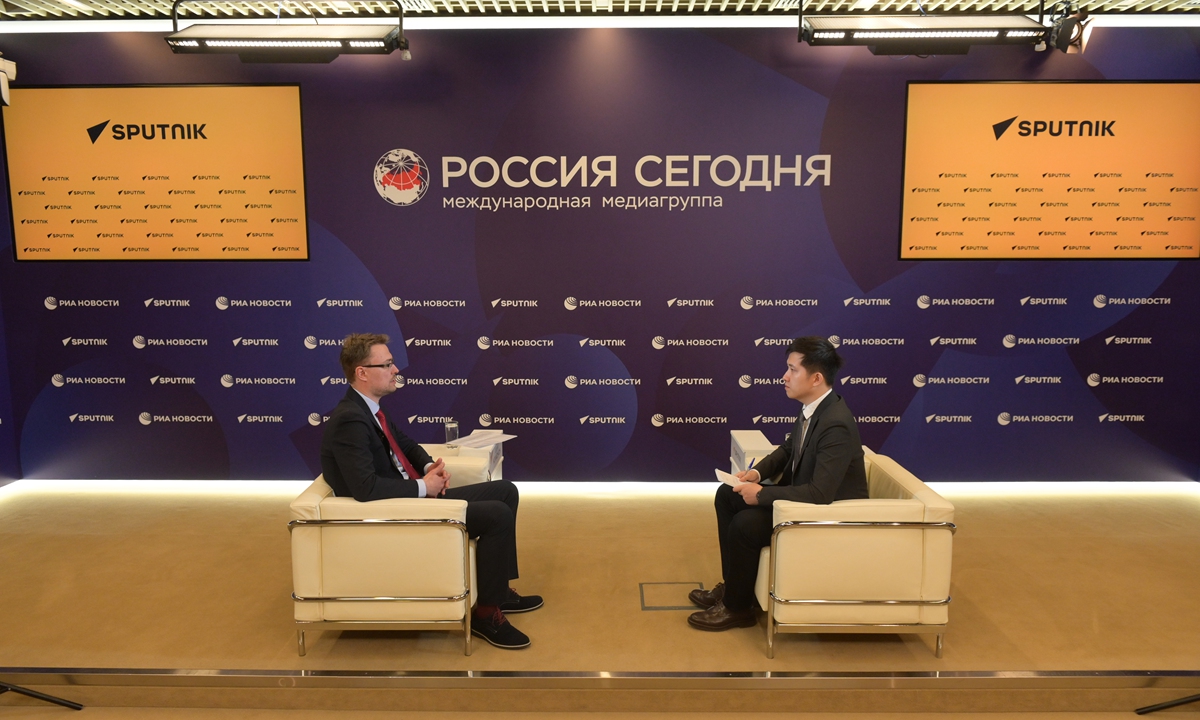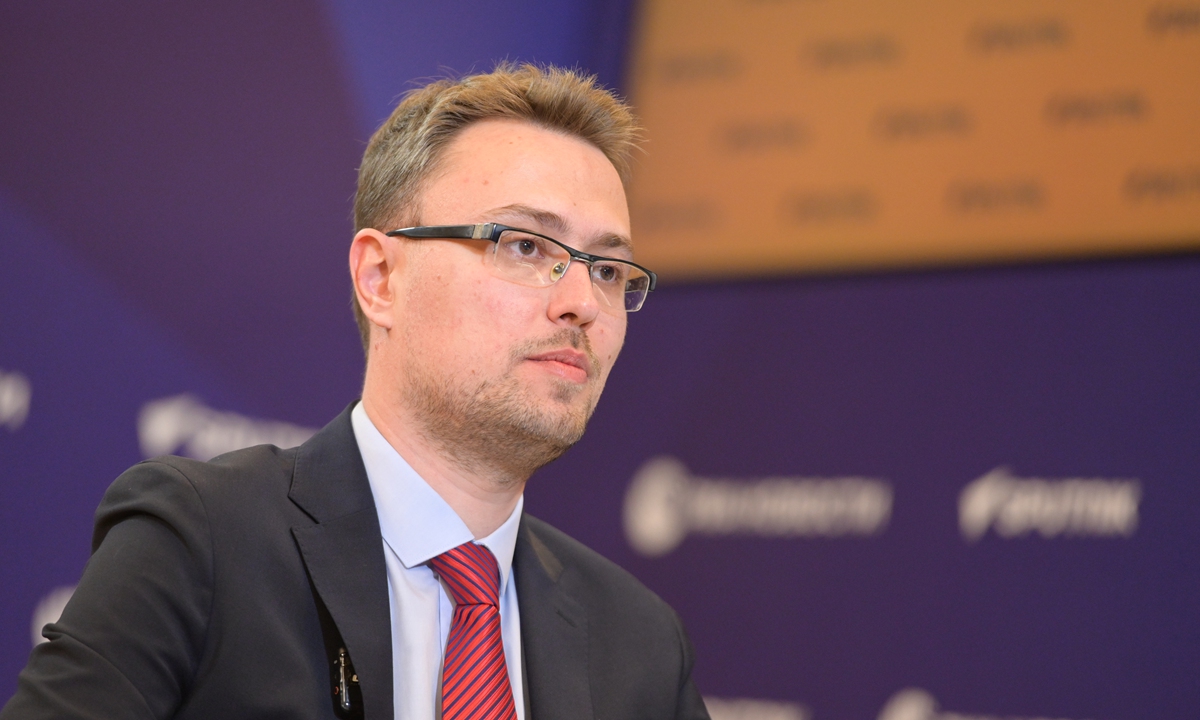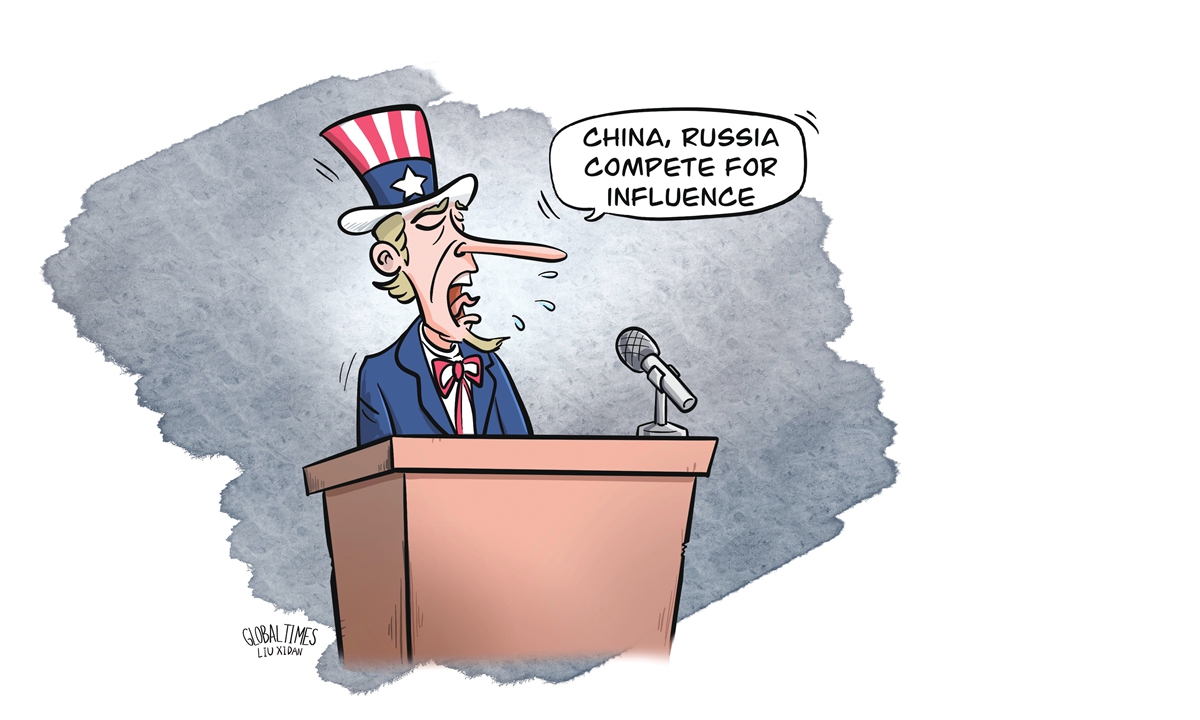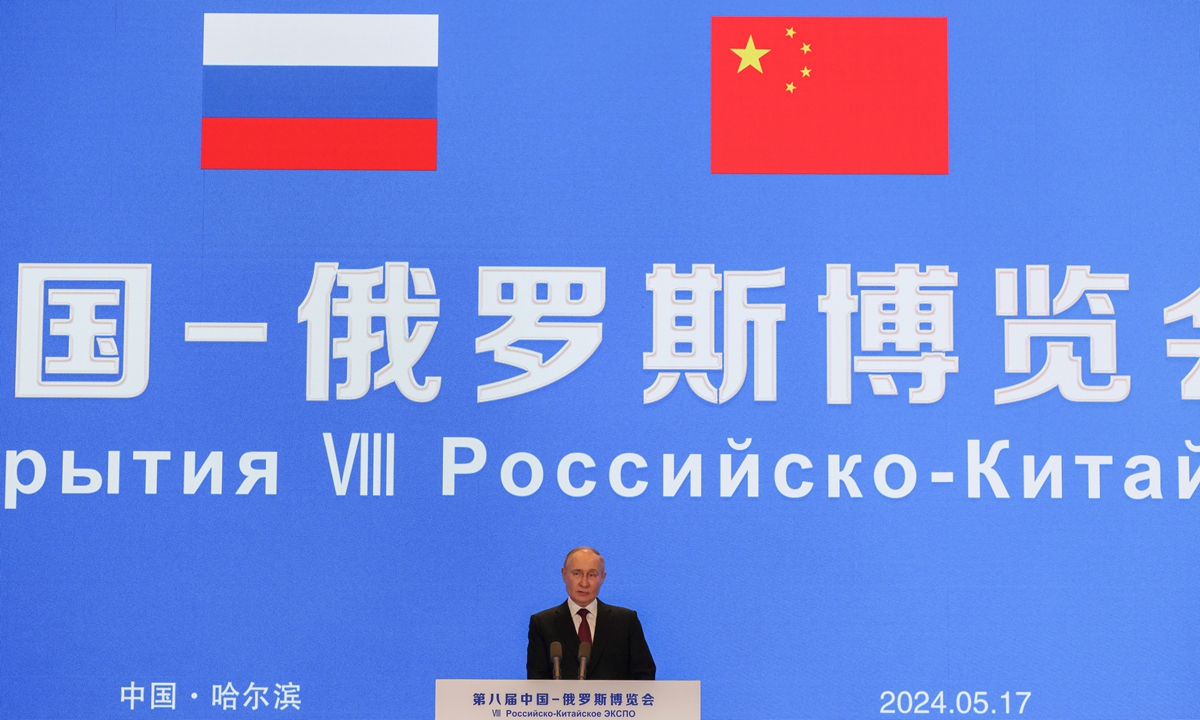
Photo: Courtesy of Sputnik
Editor's Note:
Russian President Vladimir Putin just visited China two weeks ago, his first overseas trip since his inauguration earlier this month. How can China-Russia ties develop so rapidly? What is the significance of pursuing a closer relationship between the two countries? How does Moscow see Beijing's role in promoting peace talks in the Ukraine crisis? Russian sinologist Leonid Kovachich (Kovachich), who currently is also the Head of the Asia Department of Russia's Sputnik News Agency, recently discussed these issues with Global Times (GT) reporters Yang Sheng, Xia Wenxin and Yang Ruoyu in Moscow, Russia.
GT: China-Russia relations have made very rapid development in the past years. How do you see the bilateral ties between our two countries?
Kovachich: In 2019, the leaders of our two countries announced the development of the China-Russia comprehensive strategic partnership of cooperation for a new era, thus raising the quality of Russia-China bilateral relations to an unprecedented level. Moscow and Beijing are constantly developing their cooperation, despite the fact that both countries have been under unprecedented external pressure in recent years.
Our countries are consistently pursuing a policy that is in line with our national interests, above all expanding trade and economic cooperation. Last year, trade turnover between Russia and China reached $240 billion, which was higher than predicted. Moreover, settlements in national currencies between the two countries are constantly gaining momentum. Their share already exceeded 90 percent at the end of last year.
It should be said that the foundation of Russia-China relations was laid back in 2001, when a treaty of good-neighborliness and friendly cooperation was signed. This is a very important document, because it does not introduce any too rigid obligations of the two countries, unlike, for example, a treaty on any military alliances. And it is this balance between freedom and obligations that is the key to the success of the relationship. Russia-China relations are developing so steadily because of two reasons, first, we can develop our cooperation on the basis of equality of mutual benefit, and second, we do not have to compromise our own national interests.
It is also important that our relations go far beyond trade and economic cooperation. Russia and China actively cooperate in international forums, including the United Nations (UN) Security Council. Russia's and China's vision of the modern world order and the prospects and directions of development within the framework of international institutions such as BRICS and the UN Security Council often coincide, and this is very important. This is the key to our successful cooperation, which I am sure will continue to expand.
GT: How have Western sanctions against Russia affected the lives of ordinary Russian people?
Kovachich: In principle, the Russians living throughout the country have not noticed the impact of the sanctions in general. Not being able to use Russian bank cards when traveling abroad or pay for some international services has been quite inconvenient. In everyday life, however, these are generally isolated cases, because most people still live in Russia, and the everyday life of an average Russian really hasn't seen any changes.
There was this funny moment, when sanctions were just imposed, some juice boxes in Russia's stores became simply white, because the ink of the packaging was imported. Apparently, import substitution in this particular area has also taken place, because now we can see absolutely normal juice packages just as before. In principle, everything is there, from food products, machinery to building materials.
Another good example would be cars. Before 2022, Chinese cars accounted for less than 10 percent of new car sales in the Russian market. Last year, their share reached almost 50 percent, according to some data.
So, on average, I really can't say that there have been any serious changes in the everyday life of Russians. Of course, there are a lot of restrictions, but there are no problems for living in Russia.

Photo: Courtesy of Sputnik
GT: Many people thought that Western sanctions against Russia would harm the Russian economy, however, Russia's GDP achieved over 3 percent growth in 2023. How can Russia withstand sanctions from the West and deal with these economic challenges?
Kovachich: The Russian leadership has repeatedly stated at various levels that sanctions imposed by some countries are a double-edged sword. These sanctions harm not only the target country, but perhaps even more the country that imposes them and uses the practice of long-arm jurisdiction to realize some of its own political interests. In fact, after the Ukraine conflict began in 2022, a number of countries, mainly in Europe, refused to buy Russian gas. In the next few months, gas prices in Europe soared six times.
Meanwhile, Russia was able to diversify its energy supplies quite quickly. For example, gas supplies to China increased one and a half times last year, and oil supplies to China last year exceeded 107 million tons. This is more than, for example, Saudi Arabia or Iraq supplies to China. It should be noted that Russia is not only developing trade and economic cooperation with China. Russia's trade with India, for example, also increased almost twofold last year. In addition, we are actively deepening cooperation with other countries in the Global South, in Africa and Latin America.
Despite such a dramatic deterioration of the geopolitical situation, Russia has never been the first to refuse to fulfill its contract obligations. It was ready to fulfill all its obligations, including energy supplies and other goods. It is other countries - the countries of the collective West - that have begun to intensify the trade confrontation. The whole point is that by imposing these unilateral sanctions, the West and its supporters demonstrate to the whole world the vulnerability of the model of the Western-centered financial system.
The countries of the collective West hoped for the collapse of the Russian economy. This did not happen, thanks to the competent actions of the economic bloc of the Russian government. A lot of measures were taken to stimulate domestic demand and business activity through import substitution. In fact, our economy is growing by the stimulation of consumer demand. You can go to any supermarket, not only in Moscow, but in any other Russian city and see that there are no empty shelves; all goods are presented in full assortment. Yes, indeed, some goods that were imported have now been replaced by domestic goods. If the domestic industry has been able to produce the same goods, there is already a solid industrial base for the successful implementation of import substitution.
Therefore, in general, we can say that an effective social policy supports entrepreneurship and successful import substitution. These are the main, but by no means exhaustive, list of measures that have been taken to ensure that the Russian economy is able to show positive dynamics even under such difficult pressuring conditions of sanctions.
GT: How do you predict the future development of the Russia-Ukraine conflict?
Kovachich: It is difficult to say how the situation will develop, because many factors must come together. You see, Russia has repeatedly stated that we are not against peace talks, but in order for peace talks to take place, each country must show a certain will for them to take place in a constructive way.
It is very important that the situation develops in a diplomatic way. It is clear that any military confrontation sooner or later ends at the negotiating table, but in order to achieve sustainable peace and then maintain it, it is very important not just to take into account the interests of all sides. It is also important to create a new security architecture that would be fair, objective, constructive and effective.
Russian officials at the highest level, including the President and the Foreign Minister, have all repeatedly stated that they welcome any constructive initiatives from third parties aimed at regulating the Ukraine crisis. Russian Foreign Minister Sergey Lavrov has stated that it is very important that any peace initiatives be based on a serious analysis of existing security problems, and that they take into account the legitimate interests and concerns of all parties, including those of the Russian Federation.
China's peace initiative comes primarily from analyzing the root causes of the Ukraine crisis. It is aimed primarily at trying to at least try to understand and somehow manage the causes of the crisis. In this sense, the Chinese initiative is aimed at making a constructive contribution to the common cause of resolving this problem and forming a new security architecture. Of course, China cannot solve all the problems alone, but making a step toward solving this problem is already a great success.


